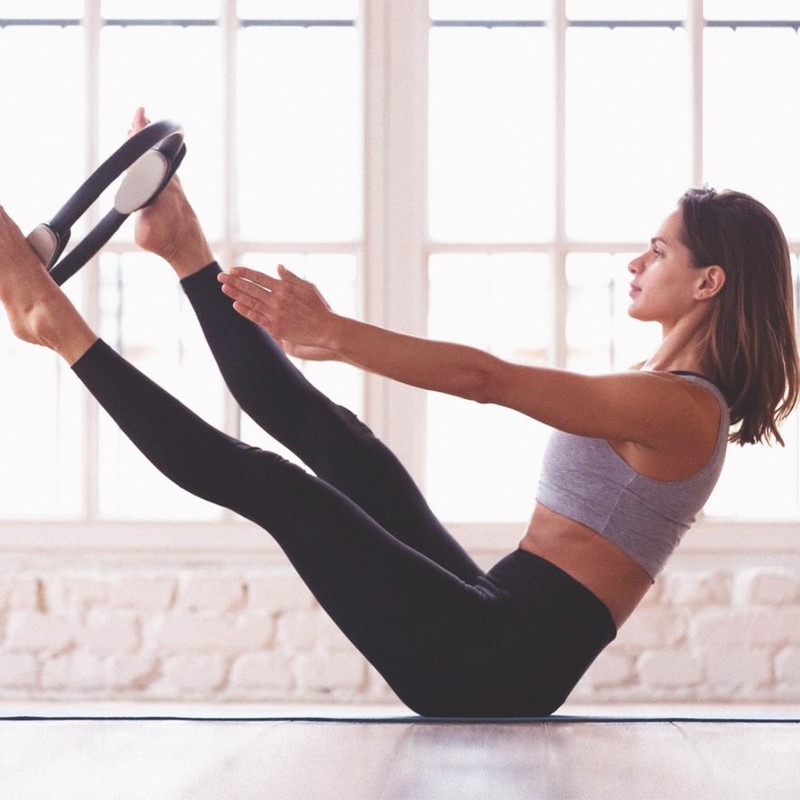How To Use A Pilates Ring
First, what is a Pilates ring?
Along with reformers and inflatable balls, this circular prop is an integral piece of kit when it comes to Pilates, and for all the right reasons. Made from flexible metal or rubber, around 13 inches in diameter, and with small pads on either side to cushion hands, thighs and ankles, the Pilates ring is designed to add resistance to your moves, increasing the burn and building lean muscle. As Zoe explains, “The Pilates ring, also known as the magic circle, adds a challenging element to your workout and activates muscles at a deeper level. In short, as you apply tension to the ring, it provides increased resistance to the muscles in return.”
How exactly is it used in a session?
“A Pilates ring isn’t designed to be squeezed to death,” Zoe says. “Instead, this prop should be used under gentle tension to activate muscles. Aim to look for a rubber ring with small pads on either side, ensuring the pads are soft so they’re comfortable when placed between ankles and knees.”
What are your tips for good form?
“It’s crucial not to apply the ring’s pads onto joints or bones,” Zoe advises. “For example, if you are doing inner thigh work and using a Pilates ring to enhance the tension, ensure the soft pads are placed on the muscle of your inner thighs and not on your knees. If you’re using the ring for arm, chest or shoulder work, ensure the heels of your hands are placed on the outside pads of the ring with your fingers reaching forward, and avoid wrapping your hands and fingers fully around the edges of the ring. This will guarantee you are engaging the correct muscles and getting the most out of your workout.”
How often should you use it?
Due to the low impact nature of Pilates and its accompanying equipment, it’s safe to practice every day. Alternate between abs, arms and lower body for optimal results, Zoe advises.
What are some of the most effective exercises you can do at home?
“Lightweight and versatile, Pilates rings are a brilliant piece of kit to be used at home, or on-the-go, if you don’t have access to a studio,” says Zoe.
Inspired? Here are some of her top moves for a tighter core, stronger shoulders and a perkier bottom…
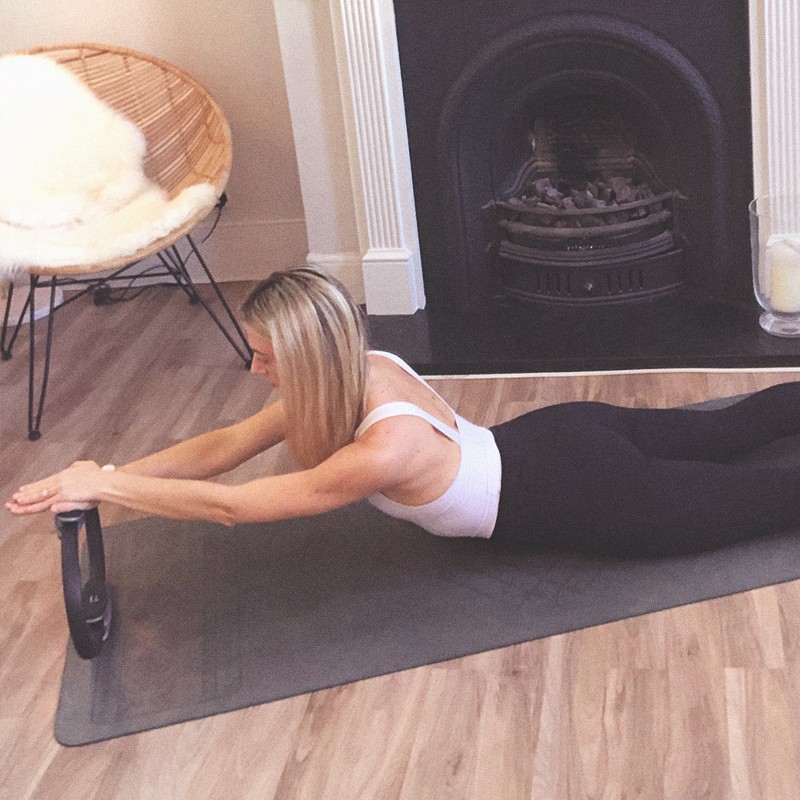
BEST FOR UPPER BODY:
SWAN
Start by lying on your front with your forehead on a mat, with your legs turned out, hip distance apart. Position your Pilates ring in front of your forehead, on its side, with the bottom pad facing down on the ground and the heels of the hands pressing down on the top pad, facing up.
- Inhale to prepare.
- Exhale as you pull your shoulders down and away from your ears; lift your lower abdominals and press the heels of your hands down on the circle, raising your head and upper body off the floor. Whilst doing this, maintain length in the back of your neck with the crown of your head lengthening forwards. Lift to your fullest upper back extension, engaging your glutes.
- Inhale as you gently melt the front of your body back down into the mat, releasing the resistance on the ring. Repeat four to six times.
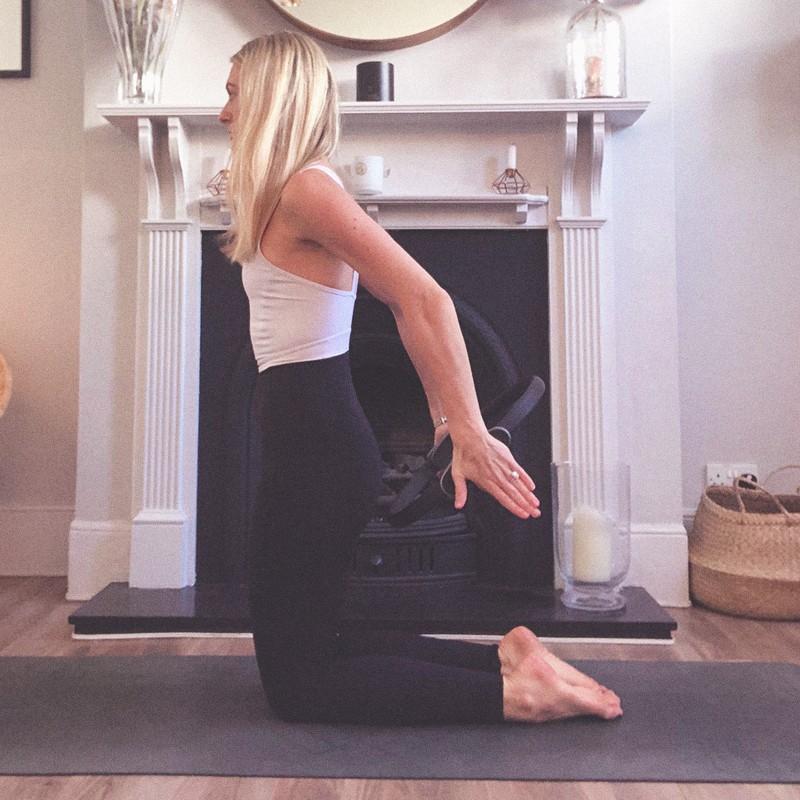
TRICEP PRESS
Start standing with your feet shoulder distance apart. Place your Pilates ring in the heels of your hands behind your back, with your elbows slightly bent and arms parallel.
- Inhale to prepare.
- Exhale to press the heels of your hands onto the soft pads, drawing them together, creating tension on the ring. Ensure the squeeze of the ring is controlled, without lifting your shoulders into your ears.
-
Inhale to release the tension on the ring; repeat eight to 12 times.
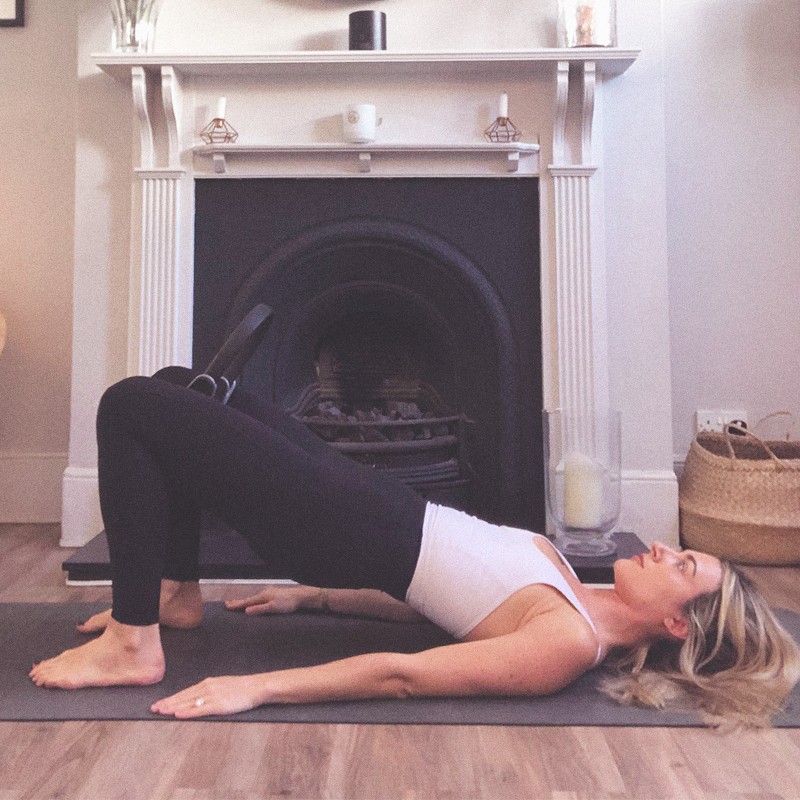
BEST FOR LOWER BODY:
SHOULDER BRIDGE
Lie on your back with your knees bent and place the soft pads of the Pilates ring in between your inner thighs. Ensure your feet are positioned hip-distance apart and parallel with your arms down by your sides, palms facing down.
- Inhale to begin as you gently draw your inner thighs together, creating resistance on your ring.
- Exhale as you draw your navel to your spine and curl your tailbone towards you, peeling your spine away from the mat, bringing yourself into a shoulder bridge. Your weight should be on your shoulders and upper back, not your neck, head or arms. Aim for your knees, hips and shoulders to be in line.
- Inhale to hold, exhale to pulse your inner thighs together.
- Repeat for eight to 12 counts.
- Exhale as you melt the spine back down into the mat, vertebrae by vertebrae.
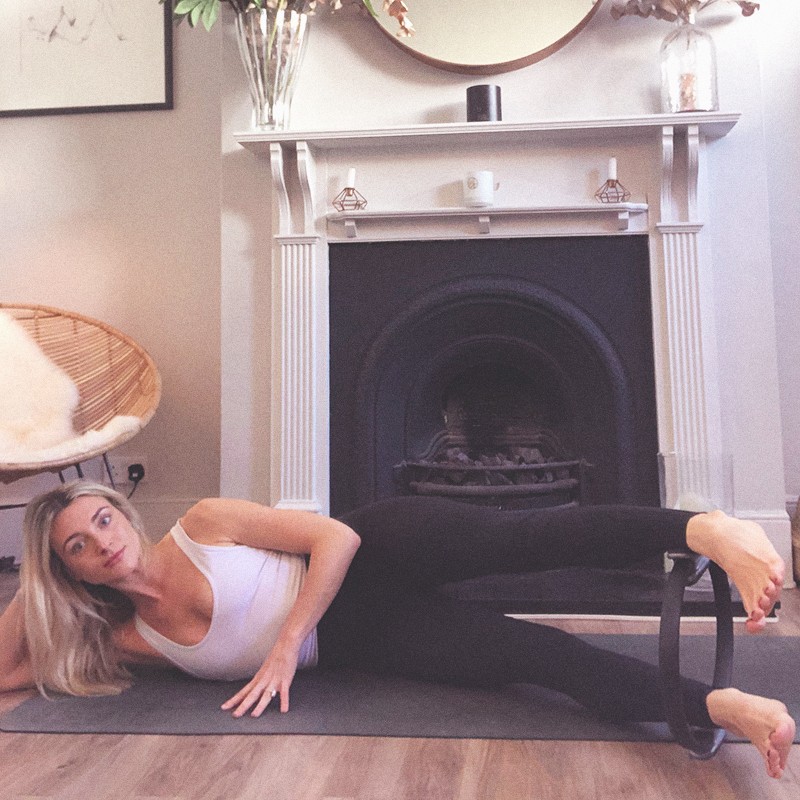
SIDE-LYING LEG LIFTS
Lie on your side, with your head resting in your hands and legs straight. Line up your upper body with the back of the mat and extend your legs on an angle away from the body – this helps with stability. Place the ring on its side, looping your bottom leg on the inside pad of the circle and the top leg on the outside pad, just above your ankle bone. Press your top hand in front of your chest on the mat to stabilise.
- Inhale to prepare.
- Exhale as you draw your navel to your spine, pressing the ring down with your top leg.
- With control, inhale as you release the press. Repeat ten times on each leg.
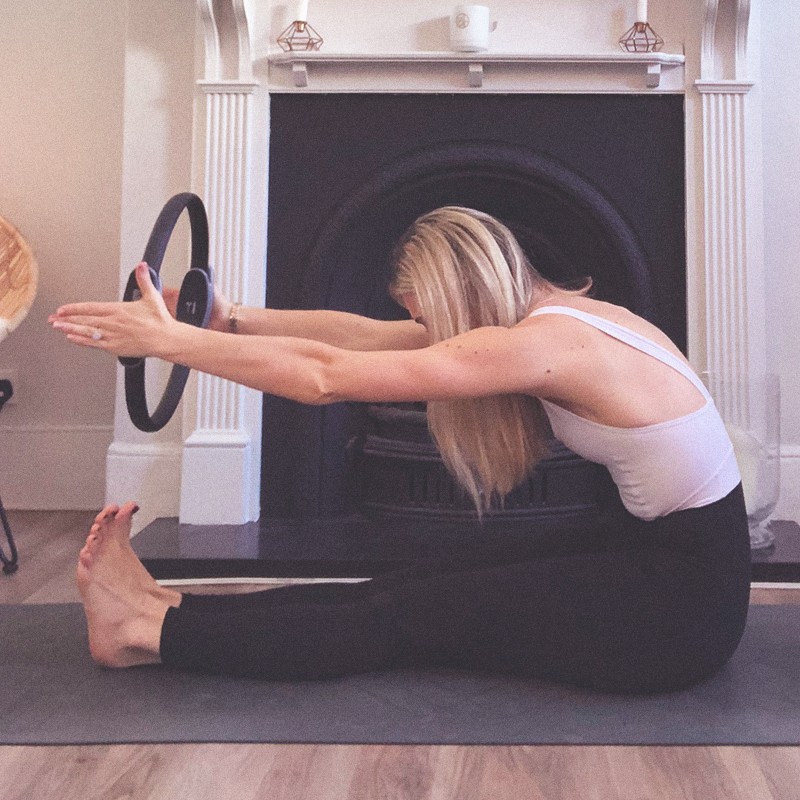
BEST FOR ABS:
ROLL-UP
Lie on your back with the Pilates ring in the heels of your hands, reaching behind you, past your ears. Extend your legs on the mat, drawing your inner thighs together with flexed feet.
- Inhale to prepare, pressing the small pads on the Pilates ring whilst lifting your arms above your head.
- Exhale as you lift your head, neck and shoulders off the mat, squeezing your inner thighs together, reaching the arms forward to find yourself in a C-shape curve position in your spine.
- Inhale as you hold the stretch and release the tension on the ring.
- Exhale to re-stack your spine, adding resistance back onto the ring whilst melting the body back into the mat.
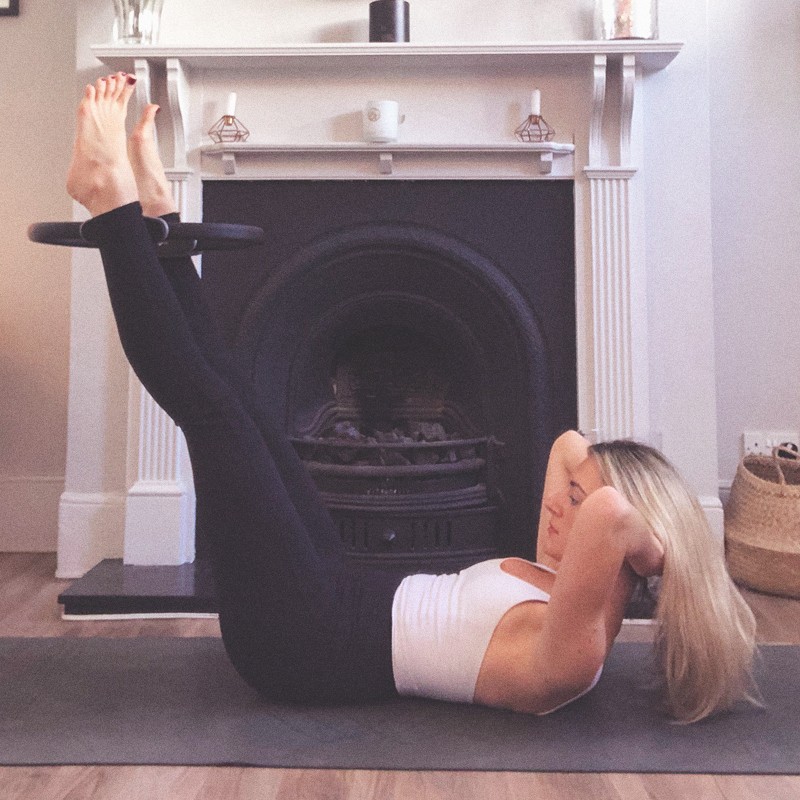
DOUBLE LEG LOWERS
Lie on your back, with your hands behind your head. Place your Pilates ring between your ankles. Start with your knees raised into your chest and your head lifted, with your neck and shoulders off the ground. Ensure your elbows stay wide and avoid pulling your neck. Extend the legs up towards the ceiling, keeping the ring between your ankles.
- Inhale to prepare, drawing your navel into the spine.
- Exhale as you lower your legs to a 45-degree angle, without lifting your lower back off the mat.
- Inhale to bring your legs back to the starting position with control, keeping your head, neck and shoulders lifted off the mat. Repeat six to eight times.
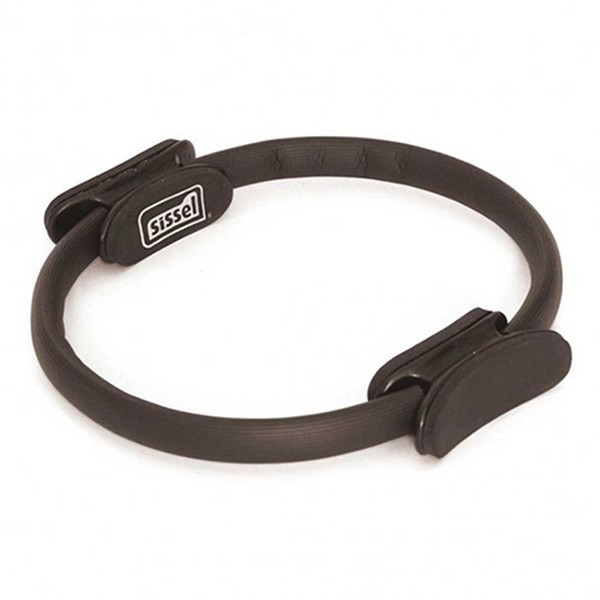
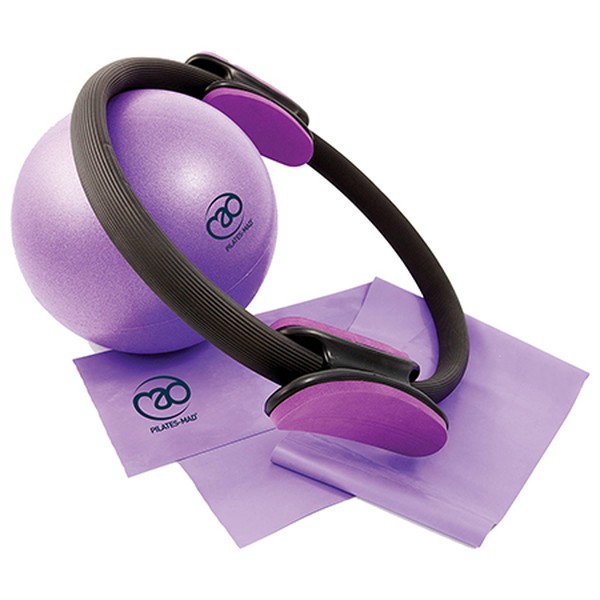
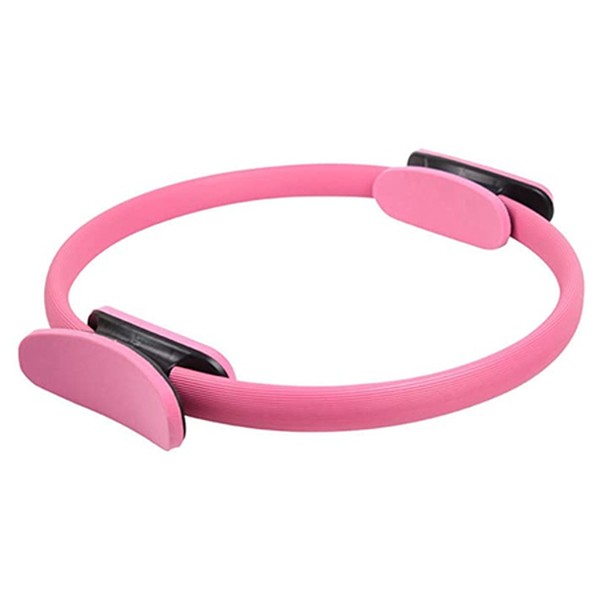
Follow Zoe on Instagram @maia.wellco or join her online Pilates classes here.
INSPIRATION CREDITS: Instagram.com/Yofima
DISCLAIMER: We endeavour to always credit the correct original source of every image we use. If you think a credit may be incorrect, please contact us at info@sheerluxe.com.
